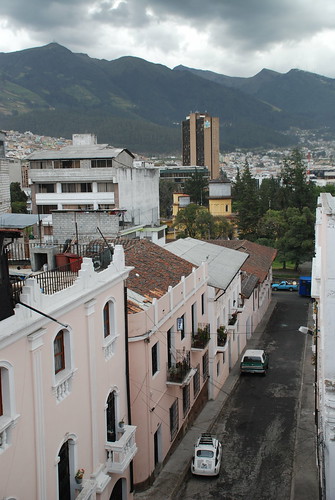Tuesday, July 31, 2007
Cool
Last night, I talked with one of the most extraordinary kids I've met in a long time. Alex grew up in Russia, but moved to the US five years ago after his mom married an American. He lives in Bozeman, and showed me his Yellowstone Grand Teton park pass. He invited me downstairs to have a cup of tea while he had a little something to eat with the malaria meds he needed for volunteering on the coast. What was so great about this kid was the way he seemed excited just to be alive in the world. Everything he described that he'd seen was "so cool." The cebiche restaurant he'd found: "so cool." Taxi drivers and their stories: "so cool." He's 20 and just wants to have lots of "life experiences." He seemed a little envious of all the places I've been, reminding me of how lucky I am. He was describing his mom as a "humanitarian" and said he guessed he was a humanitarian too. How many 20 year olds describe themselves that way?! Unfortunately, he can't go back to Russia for another seven years because he'd be drafted, and the way he described the demoralized Russian military, the beatings and suicides, was pretty grim. He didn't suggest not having a draft, just that they should allow people to work in hospitals or build trails, something productive. With his eyes wide open, taking everything in, and his constant smile, he's clearly going to do great things.
Hosteling
Right now I'm staying in a hostel. In Spanish "un hostal" isn't usually a youth hostel; rather they're cheaper places to stay than hotels. This one, however, is a place where backpackers crash, make food, and hang out. What's particularly great about this one, Hostal Revolución, is that it's owned by a backpacker, an Australian guy named Matt, so it really meets the needs of backpackers.
Traveling in Europe, hostels don't try to meet your expectations; you have to meet the expectations of the hostel. Many of them have rules like "you can't be in the hostal between 10am and 5pm," which is a particular drag when it's rainy or you need to sleep in. At one place in Lisbon, I didn't have a reservation and I wanted to stay a week. I got in the first night, but you had to make reservations three days in advance, so the next two days, I had to remove my things from my room, put them in a storage room, and be put on a waiting list. I also couldn't make a reservation for the second half of the week at the hostel but had to walk to an office several blocks away to make the reservation. I can't figure out what kind of person sets up such systems: clearly no one who has ever traveled and stayed in a hostel.
Anyway, this is a small laid back place. There are two rooms that each have six bunks, a couple of rooms for people who work here, a big kitchen, and a little bar with a foosball table where Matt will put $1.50 on your tab for a big bottle of Cerveja Brahma from Brazil. It's mostly Europeans, especially Germans, and also Americans, Canadians, and Australians, mostly people in the 20s, a few older. It's great for meeting people, except most are here only a couple days.
I don't mean to perpetuate stereotypes, but these are the facts: last night, the people playing drinking games were three German girls (who I've heard speak nothing but English) and an Irish guy. One game consisted of dancing to the song "Roxanne," beer in hand. Whenever they sing "Roxanne" the guys have to take a drink; whenever they sing "red light" the girls have to drink. I do not suggest trying this at home, but you might download the song and imagine it.
Later they were playing some game where you draw cards and that tells you who drinks. It was one of those games where people make rules. What was funny was that the first rule was every time you drink, you first have to stand up and say, "God save the Queen." Conor, the Irish guy, refused to do it, owing to, well, history. He made a big fuss, but finally relented. However, he insisted that he was saluting the Queen of Denmark.
Traveling in Europe, hostels don't try to meet your expectations; you have to meet the expectations of the hostel. Many of them have rules like "you can't be in the hostal between 10am and 5pm," which is a particular drag when it's rainy or you need to sleep in. At one place in Lisbon, I didn't have a reservation and I wanted to stay a week. I got in the first night, but you had to make reservations three days in advance, so the next two days, I had to remove my things from my room, put them in a storage room, and be put on a waiting list. I also couldn't make a reservation for the second half of the week at the hostel but had to walk to an office several blocks away to make the reservation. I can't figure out what kind of person sets up such systems: clearly no one who has ever traveled and stayed in a hostel.
Anyway, this is a small laid back place. There are two rooms that each have six bunks, a couple of rooms for people who work here, a big kitchen, and a little bar with a foosball table where Matt will put $1.50 on your tab for a big bottle of Cerveja Brahma from Brazil. It's mostly Europeans, especially Germans, and also Americans, Canadians, and Australians, mostly people in the 20s, a few older. It's great for meeting people, except most are here only a couple days.
I don't mean to perpetuate stereotypes, but these are the facts: last night, the people playing drinking games were three German girls (who I've heard speak nothing but English) and an Irish guy. One game consisted of dancing to the song "Roxanne," beer in hand. Whenever they sing "Roxanne" the guys have to take a drink; whenever they sing "red light" the girls have to drink. I do not suggest trying this at home, but you might download the song and imagine it.
Later they were playing some game where you draw cards and that tells you who drinks. It was one of those games where people make rules. What was funny was that the first rule was every time you drink, you first have to stand up and say, "God save the Queen." Conor, the Irish guy, refused to do it, owing to, well, history. He made a big fuss, but finally relented. However, he insisted that he was saluting the Queen of Denmark.
Sunday, July 29, 2007
A walk around old town
After staying out till dawn on Friday, I didn't do much yesterday. There was a birthday party for Carlos, who works at the hostel, but I went to bed and didn't go out and got crap for it this morning from Carlos, who had not yet been to bed when I went downstairs around 10:30.
So no new stories really. On Sundays they close the streets of the old town to pedestrian traffic, so I did walk around with my camera this afternoon. Here's a photo tour.

This is a guy walking around the fountain preaching in the Plaza de la Independencia. The building in the background is the Palacio del Gobierno, the capitol of Ecuador.
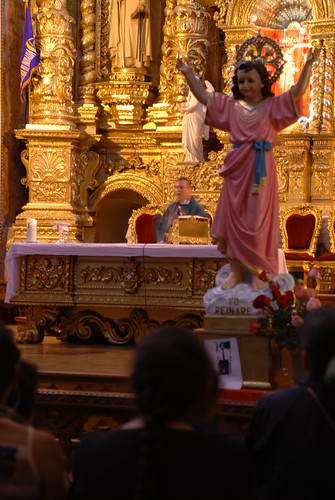
I sat in on a little of mass at the Basílica de la Merced (I think). Listening to the readings and homily were a good Spanish lesson.
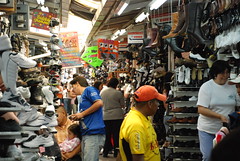
I finally found some really big markets. The Centro Comercial Granada had a huge shoe section, bigger than any shoe store I've been to in the States, but packed with scores of vendors. This is just one of several passages full of footwear. Some of the shops, like one selling watches, are as small as four feet by four feet. There are several more photos on flickr.
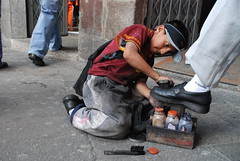
It's a poor country, and the streets are swarming with shoe shine boys. Sometimes you can barely walk without stepping on little boys offering to limpia zapatos for a quarter. My shoes have tan stitching that I like the look of, so I've had to shew them away. But I did give this kid a dollar coin for his photo.
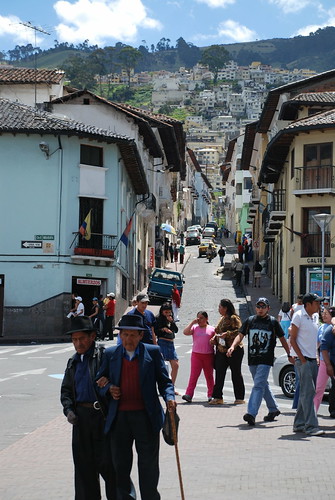
A couple of old men keeping each other steady as they walked down the street. You can see the houses going up the side of the mountain.
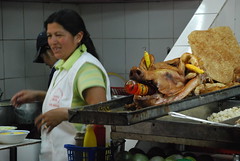
Although was no food on display at the place I described eating at the other day, it was definitely grittier than this "food court."
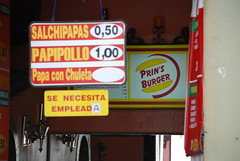
You gotta love the knock-off brands. Apparently they were looking for male workers when the help-wanted sign was made, but they've decided to switch to females.
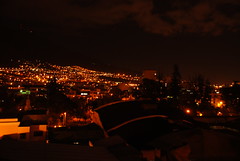
Finally, here's a night-time view from the roof of the hostal. Pretty hard to see stars in the city, but I did notice that Scorpio is straight overhead. In Ohio and California, the tail is too low to see.
So no new stories really. On Sundays they close the streets of the old town to pedestrian traffic, so I did walk around with my camera this afternoon. Here's a photo tour.

This is a guy walking around the fountain preaching in the Plaza de la Independencia. The building in the background is the Palacio del Gobierno, the capitol of Ecuador.

I sat in on a little of mass at the Basílica de la Merced (I think). Listening to the readings and homily were a good Spanish lesson.

I finally found some really big markets. The Centro Comercial Granada had a huge shoe section, bigger than any shoe store I've been to in the States, but packed with scores of vendors. This is just one of several passages full of footwear. Some of the shops, like one selling watches, are as small as four feet by four feet. There are several more photos on flickr.

It's a poor country, and the streets are swarming with shoe shine boys. Sometimes you can barely walk without stepping on little boys offering to limpia zapatos for a quarter. My shoes have tan stitching that I like the look of, so I've had to shew them away. But I did give this kid a dollar coin for his photo.

A couple of old men keeping each other steady as they walked down the street. You can see the houses going up the side of the mountain.

Although was no food on display at the place I described eating at the other day, it was definitely grittier than this "food court."

You gotta love the knock-off brands. Apparently they were looking for male workers when the help-wanted sign was made, but they've decided to switch to females.

Finally, here's a night-time view from the roof of the hostal. Pretty hard to see stars in the city, but I did notice that Scorpio is straight overhead. In Ohio and California, the tail is too low to see.
Yeah, baby.
Back to the States for a moment. My college roommate, Elliot, just sent me a photo, taken by his wonderful wife, Betsy, of him and me with their one-year-old son, Evan, and I thought I'd share it. It really was cool hanging out with the little one. It gave me a new outlook on babies. When I was a lot younger, in high school and college, I was around little kids quite a lot. I babysat. I worked with elementary school kids at summer camp and loved it enough to want to be a teacher. Somehow I ended up working with a lot older kids. For a while I really imagined myself being a father, but since I couldn't imagine myself being a husband, that dream pretty much got abandoned. None of my good friends have been the marry-young-and-start-having-kids type, so circumstance has kept me from being around many babies. The only time I really notice them is when they are throwing a tantrum on the street or in the store, kicking the back of my seat on the plane, or when a student brings their baby to school, when I have real qualms about providing even more positive attention that might make other girls think it's great to have a baby. So babies haven't really been part of my world in a long time.
It was a little weird suddenly realizing that I was supposed to really play with Evan, not just stand back and say "oh, he's so cute." But he was fun and agreeable and curious. It was a wonder to see him progress even in the few days I was there, seeing him trying to shuffle sideways to get to something nearby without having to turn and walk forward. I guess I fell for the little guy! I hope I can be around enough that he remembers me and looks forward to my North Carolina visits. And if some more babies pop into my life, that would be pretty cool too.
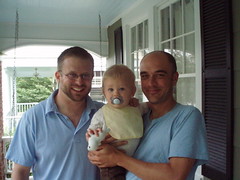
It was a little weird suddenly realizing that I was supposed to really play with Evan, not just stand back and say "oh, he's so cute." But he was fun and agreeable and curious. It was a wonder to see him progress even in the few days I was there, seeing him trying to shuffle sideways to get to something nearby without having to turn and walk forward. I guess I fell for the little guy! I hope I can be around enough that he remembers me and looks forward to my North Carolina visits. And if some more babies pop into my life, that would be pretty cool too.

Friday, July 27, 2007
Locate Me
If you're wondering where I am, open up Google Earth and enter these coordinates:
0°12'59.5" South
78°30'5.2" West
According to my GPS the hostal is at 9169 feet. It's affected me more that in the past. I had a terrible headache yesteday (which could have been from all the bus exhaust) and took 3-hour naps the first two days, but today I'm feeling pretty good, with no side effects from yesterday's almuerzo pescado.
0°12'59.5" South
78°30'5.2" West
According to my GPS the hostal is at 9169 feet. It's affected me more that in the past. I had a terrible headache yesteday (which could have been from all the bus exhaust) and took 3-hour naps the first two days, but today I'm feeling pretty good, with no side effects from yesterday's almuerzo pescado.
A Way to See the Angels
Yesterday, I visited Quito's neogothic cathedral and took a look around. It's pretty grand from the gound and inside, but taking a closer look, its concrete construction becomes obvious. For two bucks they let you climb around all over the place--another example of the lax safety standards in South America. You climb stairs up to the balcony level and then up to a floor that is open to the space between the vaulting and the actual roof. There's a creaky, bouncy wooden catwalk with rope railings that allows you to walk across the top of the ceiling to the central spire, which you can walk around and then climb some pretty terrifying stairs attached to the buttresses up to a little lookout in the top of the spire. Back at the front towers, you can climb a spiral staircase up into the clock and up rebar ladders with steps spaced about a foot-and-a-half apart up a few more levels until you are just below the top of the towers on a "floor" of wire fencing. All this climbing of course gives you really cool views of the city, even as it leaves you dizzy. If that isn't enough vertigo for you, you can pay $30 to rappel down the front of the cathedral. It's not all fun and games though: rappellers carry a broom so they can sweep the pigeon droppings and feathers out from behind the statues. X-treme volunteering anyone?
Thursday, July 26, 2007
Face to Face with My Food
The first day in Quito, I wasn't quite brave enough for an authentic meal. I had an overpriced, but tasty bowl of fruit with yogurt and granola at a new-looking old-town cafe--one of the rare places that serves actual coffee, not NesCafe. Later I went to a supermarket and bought some bread, brie and avocado to eat in the afternoon. This turned out to be a bit expensive compared to what you can get in the little restaurants on every block, but it was safe for the first day.
Today I decided I needed to eat like a local, and boy did I. I walked around for a bit scoping things out. The price for a complete breakfast or lunch is $1.00-$1.50. I found a place that looked a little nicer, where you ordered at a desk then went upstairs to a larger dining room. When I asked if they had a vegetarian lunch, I got a quizzical "no." I kept walking and got distracted by an alley that led into a whole maze of narrow walkways lined with tiny tin-roofed shops selling just about everything a poor Ecuadorian might need--clothes, house wares, appliances, building materials.
Within this market was a block building of food stalls, the kind with tiled half-walls, a counter, and a table or two in front. I stepped in and was immediately assaulted by the voices of half a dozen women trying to get me to choose their stall. The closest girl got me. I asked if they had something without meat. As I expected, she offered me chicken, since only the flesh of mammals counts as meat in Spanish.
A few months ago, I heard an interview (on To the Best of Our Knowledge, I think) with a guy who decided for a year to stop saying no and always answer yes when a question arose. Even though I'm too cautious to imagine really doing that, I'm trying to be a little more open to opportunity on this adventure, so when she listed the options and fish was the closest to vegetarian, I went for it. She sat me at a little plastic table with a couple others eating lunch and I figured out that "buen provecho" is what you say when your sitting down to eat with strangers. She brought me a bowl of quinoa soup that wasn't too meaty, aside from the huge hunk of meat and bone in the middle. I ate the liquid and left the bone, probably to the horror of the little old Quichua woman who sat down to my right. The main plate was some soupy potatoes, and a bed of rice with a whole fish on top. It's slight breading did not disguise the intact fins and head.
I suddenly realized I'd never actually eaten a fish served whole and I wasn't sure how to do it. I'd only been given a spoon, so I assumed fingers were ok. It was very fishy. The meat came away from the bones surprisingly easily, and though I stripped the middle down to nothing but bones, I wasn't so thorough towards the head. I wasn't able to get it down to the ideal cartoon skeleton. It came with a tasty glass of limeade, which certainly wasn't made with bottled water. I hope my stomach is up for the adventure!
Today I decided I needed to eat like a local, and boy did I. I walked around for a bit scoping things out. The price for a complete breakfast or lunch is $1.00-$1.50. I found a place that looked a little nicer, where you ordered at a desk then went upstairs to a larger dining room. When I asked if they had a vegetarian lunch, I got a quizzical "no." I kept walking and got distracted by an alley that led into a whole maze of narrow walkways lined with tiny tin-roofed shops selling just about everything a poor Ecuadorian might need--clothes, house wares, appliances, building materials.
Within this market was a block building of food stalls, the kind with tiled half-walls, a counter, and a table or two in front. I stepped in and was immediately assaulted by the voices of half a dozen women trying to get me to choose their stall. The closest girl got me. I asked if they had something without meat. As I expected, she offered me chicken, since only the flesh of mammals counts as meat in Spanish.
A few months ago, I heard an interview (on To the Best of Our Knowledge, I think) with a guy who decided for a year to stop saying no and always answer yes when a question arose. Even though I'm too cautious to imagine really doing that, I'm trying to be a little more open to opportunity on this adventure, so when she listed the options and fish was the closest to vegetarian, I went for it. She sat me at a little plastic table with a couple others eating lunch and I figured out that "buen provecho" is what you say when your sitting down to eat with strangers. She brought me a bowl of quinoa soup that wasn't too meaty, aside from the huge hunk of meat and bone in the middle. I ate the liquid and left the bone, probably to the horror of the little old Quichua woman who sat down to my right. The main plate was some soupy potatoes, and a bed of rice with a whole fish on top. It's slight breading did not disguise the intact fins and head.
I suddenly realized I'd never actually eaten a fish served whole and I wasn't sure how to do it. I'd only been given a spoon, so I assumed fingers were ok. It was very fishy. The meat came away from the bones surprisingly easily, and though I stripped the middle down to nothing but bones, I wasn't so thorough towards the head. I wasn't able to get it down to the ideal cartoon skeleton. It came with a tasty glass of limeade, which certainly wasn't made with bottled water. I hope my stomach is up for the adventure!
Sunday, July 22, 2007
Paternal Origins
I drove more than 1000 miles the day I left Colorado, and two weeks later, I’m still dealing with the sore neck it gave me. When you have nothing else to do but get where you’re going, why not just keep driving? I decided to push on past St. Louis, zipping in and out of tunnels right past the gateway arch. Looking at the atlas, I realized I’d have to find a place to sleep in southern Illinois, and I remembered that, though I think of my dad as being from western New York, he was in fact born in Illinois and lived there for several years. By chance he called just as I was trying to find somewhere to sleep, so he gave me the address where he’d lived. After trying a full Motel 6—they don’t seem to have (no) vacancy signs anymore—I found a recreation area campground and set up camp. When I woke up in the morning, I drove into Murphysboro to find the house where my grandmother lived with her parents and her baby son while my grandfather was in France during World War II.
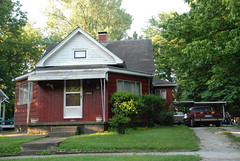
There isn’t that much to say about the place. The house’s wraparound porches had been enclosed, hurting it’s original design, but surely adding a lot of space inside. It’s painted barn red. Situated in a surprisingly forested area among lakes near the Mississippi, Murphysboro was a quaint small town that would still be recognizable to someone who hadn’t been there for 60 years. But many things have certainly changed. I bought a cup of coffee at the McDonald’s now situated in a lot directly across from the court house. What the place looked like isn’t all that important. It isn’t a place I’ve heard lots of stories about. There were no flashes of recognition—so that’s where…. My dad doesn’t remember living there, only visiting. But it was satisfying to be there for a moment. It balanced the years of living very close to where my mom’s family is from—“that’s where your great-grandparents lived when they first got married….” It seems fitting to see the place my father came from. If the whole town had been flooded for a reservoir at some point in the last half century, I still would have found it difficult to drive past on the freeway without stopping.
I’ve always been fascinated by places as they once existed, the curious connection/nonconnection of being somewhere after the fact, the right place at the wrong time. You can go to the exact location Lee Harvey Oswald shot from, or the precise spot where you had your first kiss, and on one hand there is a sense of wonder that this is where it happened, but at the same time I feel like I’m nowhere near the event, which continues to recede in time, the freedom to reexperience place only magnifying our inability to relive the past.

There isn’t that much to say about the place. The house’s wraparound porches had been enclosed, hurting it’s original design, but surely adding a lot of space inside. It’s painted barn red. Situated in a surprisingly forested area among lakes near the Mississippi, Murphysboro was a quaint small town that would still be recognizable to someone who hadn’t been there for 60 years. But many things have certainly changed. I bought a cup of coffee at the McDonald’s now situated in a lot directly across from the court house. What the place looked like isn’t all that important. It isn’t a place I’ve heard lots of stories about. There were no flashes of recognition—so that’s where…. My dad doesn’t remember living there, only visiting. But it was satisfying to be there for a moment. It balanced the years of living very close to where my mom’s family is from—“that’s where your great-grandparents lived when they first got married….” It seems fitting to see the place my father came from. If the whole town had been flooded for a reservoir at some point in the last half century, I still would have found it difficult to drive past on the freeway without stopping.
I’ve always been fascinated by places as they once existed, the curious connection/nonconnection of being somewhere after the fact, the right place at the wrong time. You can go to the exact location Lee Harvey Oswald shot from, or the precise spot where you had your first kiss, and on one hand there is a sense of wonder that this is where it happened, but at the same time I feel like I’m nowhere near the event, which continues to recede in time, the freedom to reexperience place only magnifying our inability to relive the past.
Sunday, July 15, 2007
Isn't a cell phone store supposed to sell phones?
After showing up too late the other night, Elliot and I finally got to a store to see the iPhone. We walked into the empty Winston-Salem AT&T store in Stratford Commons to find the iPhone display sitting empty. We asked one of the two clerks if they'd sold their display models, and she replied, "no we're not allowed to sell those."
"So where are they?" I asked.
"Oh it's Sunday. We're not allowed to bring them out on Sunday." What?!
Apparently the manager is worried that, with only two people working, they'll get busy and someone will walk off with the most expensive phone in the store. The only problem is, nobody will drop $600 on one either! Elliot pointed this out, but she said the rules were the rules. She did email the manager to see if she could bring one out, but he didn't respond. What kind of way to run a business is that?!
So I'm still waiting to get my hands on the thing. No matter. I can't buy yet since it won't work in Ecuador.
"So where are they?" I asked.
"Oh it's Sunday. We're not allowed to bring them out on Sunday." What?!
Apparently the manager is worried that, with only two people working, they'll get busy and someone will walk off with the most expensive phone in the store. The only problem is, nobody will drop $600 on one either! Elliot pointed this out, but she said the rules were the rules. She did email the manager to see if she could bring one out, but he didn't respond. What kind of way to run a business is that?!
So I'm still waiting to get my hands on the thing. No matter. I can't buy yet since it won't work in Ecuador.
Wednesday, July 11, 2007
Kansas
My iPod shuffle ran out of podcasts to listen to just before I got to Colorado Springs. I really should have saved them as I drove across California, Nevada, Utah, and western Colorado. The scenery was enough to keep my mind occupied. There’s a division across America, running down the front range of the Rockies. Both sides get called “America the Beautiful” and I wouldn’t say that the east side is ugly; It’s just more like America the Boredomful. There aren’t many radio stations in the sparsely populated West. Driving east, the scenery runs out a state-and-a-half before the radio stations pick up. This gap is called Kansas. (To my mind, the eastern half of Colorado is just an extension of Kansas, though I’m sure if I dared to stop, the locals would correct me.) So I faced Kansas without podcasts, or CDs, cassette tapes, or 8-tracks for that matter. Fortunately, my dad reminded me of the existence of AM radio just as I entered the Great Plains.
I tried listening to Air America, but it was mostly commercials, and what content there was was disjointed and insubstantial. The rest of the AM dial is filled with religious and right-wing talk, which is actually an advantage when traversing the country. The increased blood pressure makes it difficult to fall asleep at the wheel. Thankfully the topics du jour weren’t gays or the war, or I might have had an aneurysm at the wheel—which would be worse than falling asleep. Right now they’re mostly concerned with slamming Sicko, sight unseen, and “debunking” global warming.
All the stuff we’re hearing these days about climate change—melting glaciers, higher sea levels, more intense storms, widespread drought—I first heard in 10th grade when I did a project for biology class. That was 18 years ago! I was shocked to hear a caller start ranting about how global warming is made up, and certainly not man’s fault. He criticized the liberals for not backing up their assertions with any facts. The host concurred, and explained that liberals don’t base their thinking on facts, their arguments are pure emotion. My blood was boiling.
Two days earlier, I’d listened to a Talk of the Nation podcast with several scientists representing teams who are spending a year studying the effects of climate change on Alaska. Glaciers have retreated miles. The Arctic Ocean is losing its summer sea-ice. Thousands of square miles of permafrost have melted causing forests to fall over. Normally inch-high tundra plants have turned into shrubs that stick above the snow, absorbing more sunlight, causing further heating in the spring and fall. It was also pretty clear that scientists hold back their emotions. They refuse to say how bad they think things really are because they don’t want to make assertions until the facts incontrovertibly point to those conclusions.
The AM radio host finished his fact-free emotion-laden rant and went to break with the words “Fox News Radio—Free and Balanced.” Another enraged dose of adrenalin shot into my veins. I listened to conservative and evangelical talk radio for 24 hours driving from Colorado Springs to Asheville, and I’ll be damned if I ever heard anything remotely grounded in fact. Fortunately there will be a pilot flying me to South America and I won’t need to subject myself to such deluded rhetoric (giving them the benefit of the doubt and assuming it isn’t simply deceitful) to stay awake. I can just sleep my travels away and awaken somewhere with its own problems and politics that, for a while at least, I’ll be oblivious to.
I tried listening to Air America, but it was mostly commercials, and what content there was was disjointed and insubstantial. The rest of the AM dial is filled with religious and right-wing talk, which is actually an advantage when traversing the country. The increased blood pressure makes it difficult to fall asleep at the wheel. Thankfully the topics du jour weren’t gays or the war, or I might have had an aneurysm at the wheel—which would be worse than falling asleep. Right now they’re mostly concerned with slamming Sicko, sight unseen, and “debunking” global warming.
All the stuff we’re hearing these days about climate change—melting glaciers, higher sea levels, more intense storms, widespread drought—I first heard in 10th grade when I did a project for biology class. That was 18 years ago! I was shocked to hear a caller start ranting about how global warming is made up, and certainly not man’s fault. He criticized the liberals for not backing up their assertions with any facts. The host concurred, and explained that liberals don’t base their thinking on facts, their arguments are pure emotion. My blood was boiling.
Two days earlier, I’d listened to a Talk of the Nation podcast with several scientists representing teams who are spending a year studying the effects of climate change on Alaska. Glaciers have retreated miles. The Arctic Ocean is losing its summer sea-ice. Thousands of square miles of permafrost have melted causing forests to fall over. Normally inch-high tundra plants have turned into shrubs that stick above the snow, absorbing more sunlight, causing further heating in the spring and fall. It was also pretty clear that scientists hold back their emotions. They refuse to say how bad they think things really are because they don’t want to make assertions until the facts incontrovertibly point to those conclusions.
The AM radio host finished his fact-free emotion-laden rant and went to break with the words “Fox News Radio—Free and Balanced.” Another enraged dose of adrenalin shot into my veins. I listened to conservative and evangelical talk radio for 24 hours driving from Colorado Springs to Asheville, and I’ll be damned if I ever heard anything remotely grounded in fact. Fortunately there will be a pilot flying me to South America and I won’t need to subject myself to such deluded rhetoric (giving them the benefit of the doubt and assuming it isn’t simply deceitful) to stay awake. I can just sleep my travels away and awaken somewhere with its own problems and politics that, for a while at least, I’ll be oblivious to.
Thursday, July 5, 2007
Early morning is still night.
I found the free coffee for guests and I’m sitting outside the Bryce Canyon lodge, drinking some coffee. I woke up at 3 to drive into the park and see it by moonlight. I started hiking the Fairyland Canyon loop around 4, just before the first hints of dawn glow began to appear in the northeast. The last two times I visited, I took a night hike in the evening, but you have to wait and wait for it actually to be dark enough for the moon to cast strong shadows, for all the detail to reappear after the flatness cast over everything by the dusk’s grey sky. The moon is past full, so even if I’d waited for dark, it would have just been plain dark until the moon rose around midnight. And if you stay up till after midnight, there’s no getting up in time to see the sunrise. So I got up early enough to go on a night hike before dawn, which is pretty early.

It seems like an unusual thing to do, but not that weird, until I come into the park and it’s clear that nobody’s awake. I’m absolutely the only one hiking the trails in the magical moonlight. By dawn, maybe a handful of early risers have taken a cup of coffee to Sunrise Point, but nobody else has walked three miles out into the canyon to perch atop a hoodoo to watch the Utah sun, blindingly white from the instant it peeks over the horizon, light the whole canyon before them.
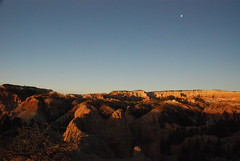

It seems like an unusual thing to do, but not that weird, until I come into the park and it’s clear that nobody’s awake. I’m absolutely the only one hiking the trails in the magical moonlight. By dawn, maybe a handful of early risers have taken a cup of coffee to Sunrise Point, but nobody else has walked three miles out into the canyon to perch atop a hoodoo to watch the Utah sun, blindingly white from the instant it peeks over the horizon, light the whole canyon before them.

Review of the Las Vegas Monorail
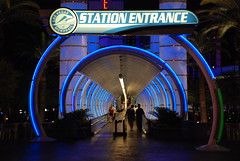
I saw the enticing neon space-age tunnel into the Bally’s casino/monorail station and couldn’t resist. Walking through those blue rings of light was the best part of the experience. So how was it? First off, this was not really the entrance to the monorail. I followed occasional signs for close to half a mile past restaurants, bars, and poker tables, through seas of slot machines and a shopping mall, past a pool and gym, before finding the promised station. Although I nearly lost my way a number of times because of the lack of signage—what happened to the neon-wrapped tunnel?—I’m pretty sure I took the most direct route. Although every building entrance on the strip in lavishly obvious, with recorded voices guiding the way even if you are no longer seeing straight, in addition to the fountains, volcanoes and pirate shows, everything in Las Vegas seems planned to prevent you from finding the exit once you’re inside.
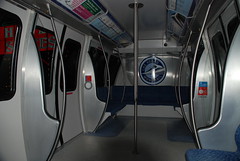
The monorail itself. Five bucks for a single ride—a bit pricey, but apparently the trams run every 7 minutes all night long! See Muni, see BART, it’s not too much to ask. I could have just as easily walked, but it would have meant enduring the exact same casino instead of another virtually-the-same casino, and I’d already spent $6 on an MGD. Besides, how often do you get to ride on a monorail, right? Once you’ve gone through the gates and up the escalator, you don’t get a very good look at the trains because the platforms are the now-popular style with a wall of doors that line up with and are synchronized to open at the same time as the car doors so nobody can fall on the tracks. Maybe not a bad idea on a transit system designed to get people back to their hotels after a night of gambling and drinking rather than to and from a sober work place.
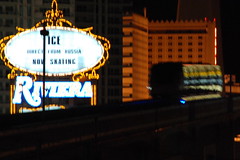
Between the closely-spaced casinos, it runs quite slowly, but this isn’t a deal-breaker compared to the pedestrian and car traffic on the strip. To experience a little more, I rode past my stop, out to the hotels, and back on a longer faster stretch--fast being a relative term. Just like the Disney monorail, the sleek design leads you to imagine zipping along fast enough to get a ticket in the Nevada desert. In reality they go no faster than a car on a city street. I suppose the advantage of being on an elevated rail is not having to stop for intersections or wait for traffic. What most interfered with the feeling of speed was slowing to a crawl to go around the unbanked 90-degree turns. And the ride was surprisingly bumpy—a serious aesthetic mismatch. Isn’t smoothness a major part of the super-modern future?
Despite the way-out-back station locations and other drawbacks, the monorail still seems to be useful for the particular needs this unusual city. It’s unfortunate that they didn’t do it well enough to make other cities consider a monorail as a real way of getting people around and not just a novelty.
Hookers don’t work the streets anymore.
LAS VEGAS, NEVADA--My mom had warned me about the prostitute promotions, but I didn’t get what she was talking about. I assumed they hadn’t realized women were prostitutes at first. What she meant was that short middle aged Mexican men pass out flyer-like cards with numbers you can call to arrange services “in less than 20 minutes.” It was very strange—no talking, they just flicked the stacks of cards so they clicked. click click click click. There were so many of them. I saw scores, often standing in small groups. The tactic surprised me, given that prostitution is legal in Las Vegas. It was out in public the way people promoting clubs often are—here check out this place, free drink—but the presentation reminded me more of the drug dealers on Haight Street and in the park whispering “kind buds” as you pass. Is illicitness a necessary part of the deal? The main thing I wondered though was the economics of all these men doing the street work. Clearly it frees up the hookers to spend more time doing what they’re paid for. But even if all these guys are undocumented and making less than minimum wage, the industry must be raking it in to make it cost effective to have so many live bodies doing personal, but untargeted advertising. I didn’t see a single person take a card. How many sales can they really be making? Enough, which must be a lot, apparently.
Subscribe to:
Posts (Atom)
